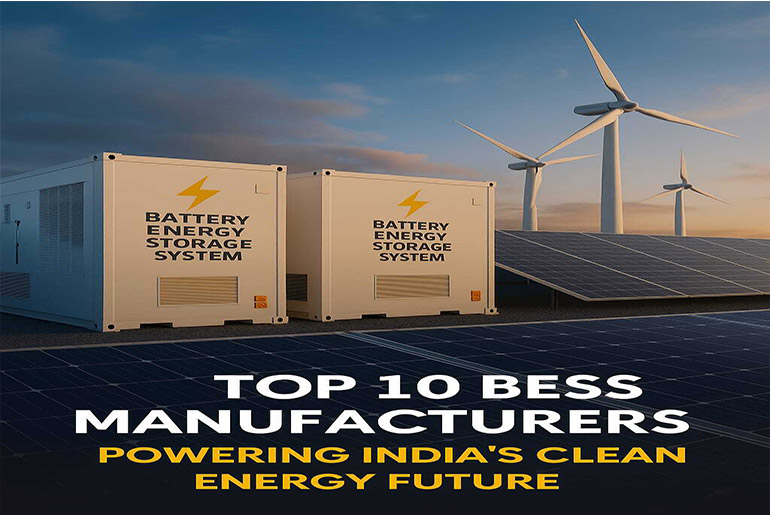Every hour, India generates enough renewable energy to light up millions of homes, yet much of it goes to waste due to lack of storage. As the country crosses the halfway mark toward its 2030 clean energy target ahead of schedule, the need for energy storage systems has never been more urgent. The spotlight is now firmly on Battery Energy Storage Systems (BESS) manufacturers as the linchpin of India’s renewable energy ambitions.
From managing intermittent renewable power to ensuring grid stability and supporting electric vehicle infrastructure, BESS is being prioritized as a core pillar of clean energy transition. The government is not just talking—it’s acting. Tenders, incentives, and manufacturing-linked schemes are fueling a battery revolution. Let’s explore the top manufacturers powering this transformation.
Policy Driver: Government Initiatives to Promote Battery Energy Storage System (BESS)
India has made clear policy commitments to build a BESS ecosystem:
➢ Production-linked incentive (PLI) scheme for Advanced Chemistry Cell (ACC) Batteries: ₹18,100 crore total subsidy; set up domestic battery cell manufacturing support
➢ Energy Storage Obligation (ESO): Applications obligation on distribution companies to procure a defined % of energy procurement from a system enabled by energy storage
➢ Viability Gap Funding (VGF): Recent large procurement tender (i.e., 2,000 MW/4,000 MWh in Gujarat) has made surmising government support financially viable.
➢ Draft National Energy Storage Policy: Framework to embed energy storage into planning, procurement and grid operations
These initiatives have positioned India to close the renewable generation capacity gap relative to grid reliability; the value added from BESS is beginning to take hold rather than be an add on.
India’s Top 10 BESS Manufacturers
Below is a list of the top players driving innovation and production of BESS in India:
- Exide Energy Solutions: A subsidiary of Exide Industries, it is setting up a 12 GWh lithium-ion battery manufacturing plant in Bengaluru. The company is well-positioned due to its legacy in battery tech and its shift toward clean energy solutions.
- Amara Raja Advanced Cell Technologies: Backed by Amara Raja Group, this company has bid under the ACC PLI scheme and is working on a gigafactory to support EVs and grid-scale storage.
- JSW Neo Energy: Part of the JSW Group, it has entered both battery manufacturing and project development, including bids under SECI’s BESS tenders. It plans significant domestic capacity in advanced battery technologies.
- Reliance New Energy Ltd.: Reliance is building a massive integrated energy ecosystem including solar, green hydrogen, and battery storage. It has received PLI backing and is exploring Li-ion and sodium-ion chemistries.
- Waaree Energies: Waaree is better known for its solar modules, but it’s expanding into bundled solar-plus-storage solutions and is bidding under the ACC battery PLI scheme.
- Tata Power Solar: Although Tata Power is more of a developer and integrator, it’s now coming along strong in battery project deployment and plans to scale manufacturing in the near future.
- Panasonic Energy India: An established name in battery manufacturing, the company is working on aligning its operations to meet the growing demands for energy storage in both consumer and industrial segments.
- HBL Power Systems: HBL has a long history in specialized batteries and is starting to invest in lithium based solutions and looking at BESS opportunities for the defense and grid market.
- Greenko Group: While not a manufacturer, Greenko is a large-scale BESS developer, building pumped hydro and battery hybrid systems. It partners with manufacturers for supply.
- Sunlit Power (SunGarner): This emerging player is focused on modular, scalable BESS for C&I and renewable developers. It emphasizes integration and system design.
Manufacturers vs developers: Differentiating the roles
Some names in this list are, in reality, developers or integrators rather than cell manufacturers. Just to clarify:
Manufacturers make battery cells and packs (e.g., Exide, Amara Raja);
Developers deploy storage projects using battery cells purchased from an OEM (e.g., Greenko, Tata Power)
It is critical to differentiate these categories while studying developments in the BESS market.
Tenders Speeding Up Market Growth
Recent government-sponsored tenders illustrate the size of the opportunity:
- Gujarat 2,000 MW / 4,000 MWh BESS Tender: The largest standalone storage tender initiated in India and having bids from all of the major OEMs.
- Tamil Nadu 1,000 Megawatt hour Storage Tender: Awarded the project to three private players under BOO (build-own-operate).
- SECI’s BESS Renewable + storage tenders. Hybrid tenders combining renewable solar / wind and mandatory storage have already led to successful commercial deployments.
All of the tenders incentivize both project deployment and local manufacturing, thereby creating a virtuous circle in India’s storage ecosystem.
The Future: Challenges and Opportunities
Challenges:
- Battery systems have high initial costs
- No harmonized performance standards
- Recycling infrastructure developing
Opportunities:
- Policy clarity, subsidies
- Potential to export in Asia, Africa and Middle East
- Increased C&I demand for reliable backup
India’s battery energy storage story is being written right now, and these leading manufacturers are helping to level the field. With the central and state policies aligning, improved supply chains, and local technology development, we see the possibility that India could become a global center of BESS manufacturing and innovation over the next 5 years. Stay tuned as India progresses with lithium storage, innovation, and sustainability.



